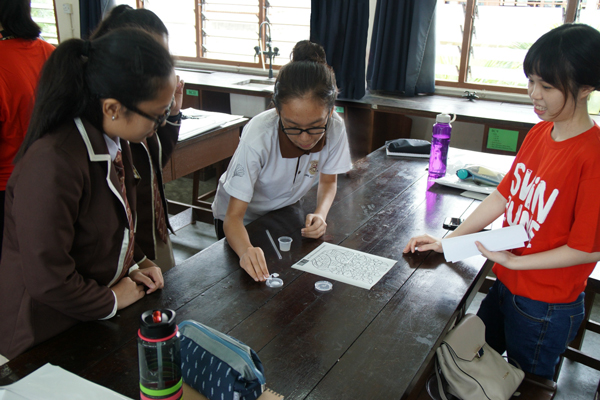KUCHING – A team of students and lecturers under Swinburne University Of Technology Sarawak Campus’ Biotechnology Club visited SMK St Teresa in Kuching to share knowledge relating to the future of farming on 6 July.
According to Dr. Ng Sing Muk, Associate Director, Swinburne Sarawak Research, Consultancy and Future Projects, “Future farming is the next revolution in the agriculture sector that could provide food security for the ever growing human population.”
“It shifts from conventional farming with the use of precise technologies such as biotechnology and information and communication technology in order to produce a high yield and quality crops”, he added.
“Malaysia is one of the few countries that is heavily involved in the agriculture sector and future farming agenda is foreseen to be relevant in helping the country generate more income, while using less labour on the field”, said Dr Ng, who is also the advisor for the club.
Swinburne Sarawak was invited to participate in the school’s Science and Mathematics Week where they shared knowledge on plant tissue culture, an efficient method in duplication of various parts of a plant for more efficient farming. This method is a change from the conventional method of growing plants from seeds or stem cutting.
Plant tissue culture is a biotechnological concept that utilises living organisms or bioprocesses to produce products from various areas of industry such as agriculture and the medical sector.
“The students have this topic as part of their biology syllabus, but don’t have the opportunity to relate it to real life scenarios or to perform the practical work to culture plants in school,” explained Cikgu Susieana Joseph, the teacher-in-charge.
“We are happy that Swinburne’s biotechnology students are willing to share this experience with us and make it possible for some of our students to perform the practical work related to plant tissue culture”, she added.
The students were also presented with a talk relating to general biotechnology and specifically to plant tissue culture. They were also informed on the practical and important aspects of culturing tasks, a valuable skill which Swinburne’s biotechnology students learned in their biotechnology degree program.
The school students were then led through some hands-on activities related to plant tissue culture in the labs. During the experiment, five groups of students were voted as among the best in hands-on activities and were invited to visit Swinburne Sarawak during its Open Day in August. These group of students will have the opportunity to perform a plant tissue culture activity during the visit.
“We look forward to their visit and to expose them to a working laboratory. Hopefully this can trigger their interest in the area of biotechnology and spearhead this agricultural agenda in near future” said Ting Lik Fong, a biotechnology lecturer with the Faculty of Engineering, Computing and Science.


